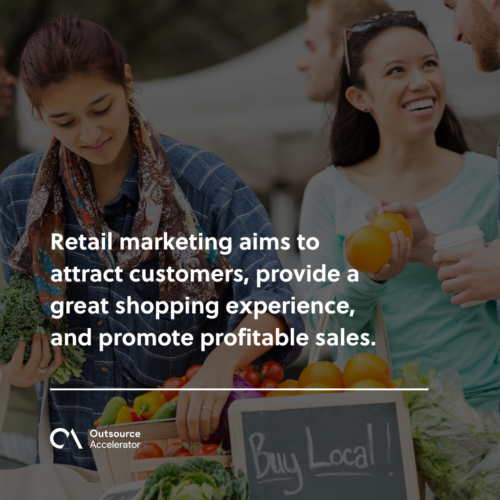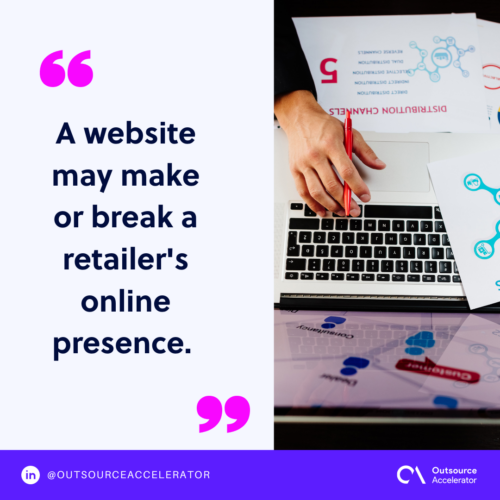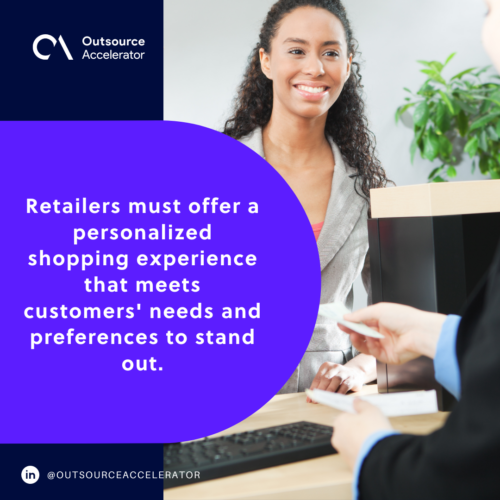Retail marketing: Understanding the retail landscape

Businesses in the retail sector always need to reevaluate their strategies to increase their market competitiveness. They must constantly innovate marketing approaches to adapt to the changing consumer demands and achieve customer satisfaction.
While technological advancements have made it easier for enterprises to access a wider audience and rapidly expand their operations, there are still challenges.
Effective retail marketing strategies are also crucial to combat sales obstacles, attracting consumers, and staying ahead of the competition. Understanding the retail landscape can help companies to succeed in the ever-evolving economic environment.
Definition and importance of retail marketing
Retail marketing refers to the merchants’ actions and techniques to sell their products or services to their target clients.
Some common examples of a retail marketing technique are:
- Advertising
- Branding
- Pricing
- Merchandising
- Customer relationship management
Retail marketing aims to attract customers, provide a great shopping experience, and promote profitable sales. It also assists shops in differentiating themselves from the competition. This is done by displaying distinctive selling propositions and developing brand identity.

When done correctly, retail marketing methods boost brand awareness and client loyalty, resulting in repeat business and consumer recommendations.
Furthermore, retail marketing allows businesses to understand customers’ requirements and preferences. This will enable enterprises to adjust their products and increase consumer happiness.
Evolution of retail marketing
The rise of new technologies and shift in shopper preferences have contributed much to retail marketing’s dramatic development.
Digital marketing tactics have also improved and replaced more traditional advertising approaches, like print ads and television advertisements.
The internet has opened new communication channels between shops and customers worldwide, allowing retailers to reach greater audiences.
But take note that while social media has transformed retail marketing, it has also brought new challenges in the market, such as:
- Greater competition
- Managing online reputation
- Keeping brand consistency across platforms
However, with the right strategies and a clear grasp of the target market, merchants may use social media to boost their marketing efforts.
Significant types of retail businesses
The retail marketing industry comprises various companies, each with unique characteristics and target audiences.
Here are the significant types of retail enterprises:
Department stores
Large retail establishments that offer a wide range of products across multiple categories. They cater to diverse customer needs, providing a one-stop shop for everything from clothing to electronics to home goods.
Department stores often offer a range of brands and price points, making them accessible to a broad customer base.
Specialty stores
This type of retail shop focuses on a specific product category or niche and provides selected products that appeal to customers’ eyes.
Sales clerks in this area offer expert knowledge to customers passionate about a particular hobby or interest.
Supermarkets and hypermarkets
Grocery stores that offer various food and household items at competitive prices. In terms of retail marketing, it often offers a range of brands and price points, catering to customers with different budgets and preferences.
E-commerce retailers
Sell products and services exclusively through digital marketing platforms, providing convenience and accessibility to customers.
E-commerce retailers often provide a seamless shopping experience with features like personalized recommendations and easy checkout processes.
Retail marketing approaches
To effectively reach and engage target customers, retailers leverage various marketing channels.
These approaches help retailers promote their products or services, drive traffic to their stores or websites, and generate sales.
Let’s explore some of the essential retail marketing channels:
Website and e-commerce
In retail marketing, a website acts as a virtual shop, displaying information about the company. It also shows items or services and allows online transactions.
A website may make or break a retailer’s online presence. The web developer’s job is to create and maintain the website’s performance.

A well-designed website should be easy to navigate and optimized for search engines to boost exposure.
This retail marketing channel includes a secure payment gateway and several payment methods. Moreover, it greatly helps in decreasing cart abandonment and increasing sales.
For instance, Amazon, the world’s largest online retailer, has a user-friendly website and an e-commerce platform that allows people to buy items from various categories. Customers may easily browse for items, read reviews, and purchase on Amazon’s website.
This retail marketing strategy of Amazon provides a secure payment gateway, several payment choices, and a simple checkout experience. This has aided this market’s rise to prominence in the e-commerce business.
Search engine optimization
Search engine optimization (SEO) is one of the critical retail marketing strategies for increasing a retailer’s online presence.
Retailers may improve their search engine rankings by refining their website content and meta tags and using relevant keywords. This increases organic traffic and the likelihood of reaching potential consumers.
The content and marketing team researches to uncover suitable keywords and phrases that potential customers search for while optimizing a website for search engines.
After, the keywords are incorporated into the retailer’s website content, meta tags, and URLs.
For instance, Nike, a major sports footwear and clothing store, has optimized its website for search engines. Nike’s website appears on the first page of search results when a customer searches for “running shoes” on Google.
This is due to Nike’s use of important keywords in its website text and meta tags, which increases its visibility to potential buyers.
Pay-per-click advertising
Pay-per-click (PPC) advertising lets stores place specific adverts on SERPs and other websites. In exchange for ad clicks, retailers are charged a fee. This type of retail marketing can bring in many customers and show results immediately.
Successful PPC campaigns start with thorough keyword research, which merchants may perform. Merchandisers also use catchy ad language and attractive images to entice customers to purchase more products or services.
Influencer marketing
Influencer marketing entails partnering with popular individuals with a significant number of online engagements and followers.
You can see a lot of brands online being advertised by a youtube vlogger or TV personality to captivate’s audience interest into buying the product.
Developing an effective influencer marketing strategy requires seeking influencers whose audiences and ideals match the brand.
Further, this retail marketing allows influencers to use their unique voices to promote essential items. Retailers monitor the campaign’s status to know which audience engaged with the influencer and the product.
Email marketing
Retailers may use email marketing to interact with existing customers and nurture leads. Merchants may advertise new items, discounts, or promotions in this retail marketing approach.
Email marketing updates consumers on forthcoming events or sales by sending tailored and targeted emails.
Merchants using this retailer marketing approach may establish a successful marketing campaign by segmenting their email list. Segmentation helps to identify which audience to send a targeted email to.
Retail marketing: Challenges and solutions
Despite its key benefits, retail marketing poses challenges. Let’s explore some common drawbacks retailers face and the solutions to overcome them:
Increasing competition
One of the retailers’ biggest challenges is increasing competition from traditional brick-and-mortar and online retailers.
Retailers must offer a personalized shopping experience that meets customers’ needs and preferences to stand out.

Solution: Personalization
Personalization is one answer to this retail marketing challenge. Retailers may utilize data and technology to understand consumers’ wants and interests better.
This will allow the business to offer personalized product suggestions and promotions that are more likely to be successful.
Moreover, personalization may assist merchants in increasing client loyalty and revenues over time. Retail businesses may also separate themselves from the competition and reach a larger audience with various preferences they could cater to.
Changing consumer behavior
Consumer behavior is rapidly evolving, with many customers prefer shopping online and use mobile devices to make purchases.
This can make it challenging for retailers to keep up with changing consumer demands and offer their products and services using traditional methods.
Solution: Omnichannel retailing
Retailers in today’s competitive market must provide a unified online, in-store, and mobile shopping experience.
Merchants must combine their digital and physical offerings via the omnichannel retailing method. Traditional methods tires most salespersons from offering the services with pamphlets in face-to-face interactions.
Omnichannel retailing allows stores to save time and effort. Not only will this benefit the store in gaining more customers, but this can also ease the physical interactions of salespersons.
Further, mobile applications and social media will enable stores to interact with customers in real-time and tailor their offerings accordingly.
Supply chain distributions
Because of the retail industry’s complexity and rapid changes, supply chain management presents a significant obstacle to retail marketers.
The COVID-19 pandemic, for instance, has highlighted the fragility of global supply chains. Because of this, retailers have dealt with disruptions and delays in the supply chain.
Keeping the right items in quantity at the right time requires retailers to coordinate with a wide range of vendors.
Solution: Social media marketing
Social media marketing might help with this difficulty. Suppliers may effectively interact with their target audience and raise awareness of their products using this channel.
Nowadays, almost all brands are utilizing social media. This shows a need to adapt to several online platforms to cater to customers despite supply chain challenges.
Merchandisers may expand their consumer base and foster brand loyalty via social media to market their goods and services. They can utilize different online channels to keep in touch with their consumers.
Merchants can notify their customers of any delays or other problems that may arise due to supply chain interruptions. Retailers can also cooperate with many vendors to lessen their dependency on any provider.
Retail marketing in a nutshell
Overall, retail marketing can help businesses to deliver an enjoyable browsing experience and encourage profitable purchases. Effective marketing strategies let retailers overcome challenges, attract customers, drive sales, and build a strong brand presence.
To ensure success in retail marketing, a lot of businesses nowadays partner with premier outsourcing companies like OP360 as they are able to work with experts while saving on costs.







 Independent
Independent




